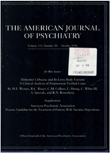Sexual abuse and bulimia nervosa: three integrated case control comparisons
Abstract
OBJECTIVE: This study had three aims: to determine whether sexual abuse increases the risk of developing bulimia nervosa, to see whether any increase in risk is specific to bulimia nervosa, and to determine whether patients referred for treatment of bulimia nervosa differ from a community group of subjects with bulimia nervosa with respect to their exposure to sexual abuse. METHOD: A case control design with individual matching was used. There were three related case control comparisons. Fifty community-based subjects with bulimia nervosa were compared with 100 community-based comparison subjects without an eating disorder, 50 community-based comparison subjects with other psychiatric disorders, and 50 patients (secondary referrals) with bulimia nervosa. An investigator-based interview was used to assess sexual abuse. RESULTS: Sexual abuse involving physical contact was reported by a minority of the community-based subjects with bulimia nervosa. It was more common among this group than among the normal comparison subjects. There was no difference between the community-based subjects with bulimia nervosa and either the subjects with general psychiatric disorders or the patients with bulimia nervosa. CONCLUSIONS: While the findings indicate that sexual abuse is a risk factor for the development of bulimia nervosa, it does not appear to be specific to bulimia nervosa nor is it relevant to most cases. Sexual abuse appears to be a risk factor for psychiatric disorder in general (including bulimia nervosa) among young adult women. There was no evidence that secondary referrals of bulimia nervosa are biased with respect to sexual abuse.
Access content
To read the fulltext, please use one of the options below to sign in or purchase access.- Personal login
- Institutional Login
- Sign in via OpenAthens
- Register for access
-
Please login/register if you wish to pair your device and check access availability.
Not a subscriber?
PsychiatryOnline subscription options offer access to the DSM-5 library, books, journals, CME, and patient resources. This all-in-one virtual library provides psychiatrists and mental health professionals with key resources for diagnosis, treatment, research, and professional development.
Need more help? PsychiatryOnline Customer Service may be reached by emailing [email protected] or by calling 800-368-5777 (in the U.S.) or 703-907-7322 (outside the U.S.).



